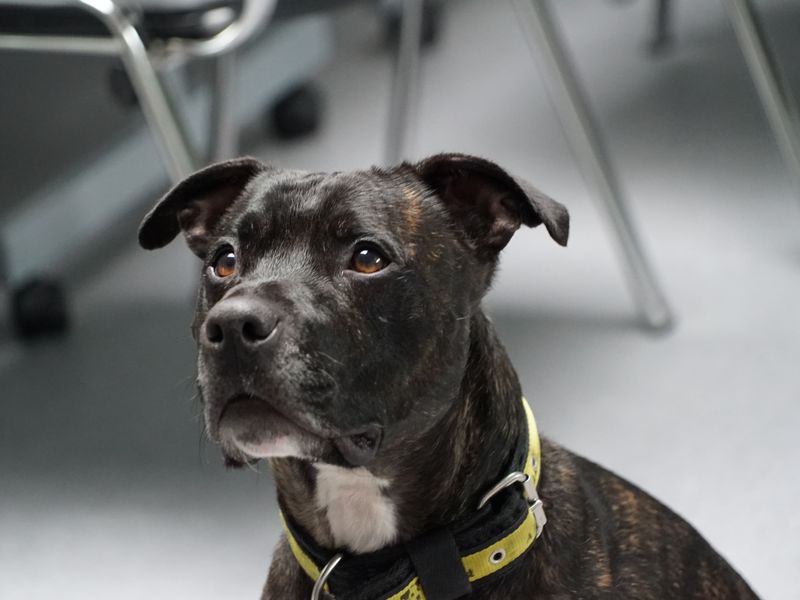Finding behaviour and training support
Need help with your dog? Find out the difference between a trainer and behaviourist so you know who to approach.

Sometimes our furry friends show behaviours that we don’t know how to help with. From jumping up or stealing food, to aggression.
It’s normal to need a little extra help during your dog’s life. So, don’t be afraid to reach out for some.
Do I need to see a behaviourist or a trainer?
They may sound like they do a similar job, but trainers and behaviourists have specific skills in different areas. Not sure which one’s for you? This page will help shed some light on your options.
What’s the difference between a behaviourist and a trainer?
Dog trainers
Dog trainers specialise in teaching you how to use your best pal’s favourite rewards to teach them what you’d like them to do. Things like:
- walking nicely on lead
- teaching your dog not to jump up
- teaching them not to beg for food
- to settle down quietly when you need them to.
Trainers can also help with specific types of activity like:
- agility
- obedience
- training tricks
- nose-work (teaching your dog to find hidden items by smell).
A trainer will usually help you improve your own training skills too while teaching your pooch.
Dog behaviourists
Dog behaviourists specialise in problems that are more emotional for our four-legged friends. These often include one or more of:
- anxiety
- fear
- frustration.
Feeling like this can lead to dogs behaving in ways that endanger themselves or others. So, it’s important to address the root cause with the help of a behaviourist.
These aren’t issues that simple training will fix. Behaviourists can identify underlying emotional distress and map out a plan tailored for your individual dog. They’ll then teach them a more positive way of behaving.
How do I find a dog trainer?
The Animal Behaviour and Training Council (ABTC) is a good place to look for dog trainers. They keep a database of accredited animal trainers in the UK, making sure good standards are met.
How do I find a dog behaviourist?
The first step is always to speak to your vet. If there’s a change in your dog’s behaviour, or it’s concerning you, have your vet examine them.
If your vet thinks your dog needs help from a behaviourist, they can refer you.
Why do I need to see a vet first, before seeing a behaviourist?
Medical conditions can affect the way a dog behaves. A change in behaviour could be a sign your pup is unwell or in pain. It might not be obvious, but it could be picked up by a vet.
A history of sore ears, for example, could be relevant to why they’ve recently started growling when you stroke near their head.
It’s important to rule out medical issues out before taking further steps. Your vet can then refer you to a behaviourist and give them your dog’s medical history to help with their investigation.
How do I choose a dog behaviourist?
Having spoken to your vet, you can then look for a suitable behaviourist. Certified Clinical Animal Behaviourists (CCAB) is an independent organisation that accredits behaviourists, so is a good place to find one.
Inappropriate or outdated advice can negatively impact your dog’s welfare. And it could make a behavioural problem worse in the long term. So, it’s important seek help from the right place.
Accredited behaviourists will work alongside a vet, so that any underlying illness, injury or pain is treated alongside behavioural support.
When choosing a behaviourist:
Check their qualifications. Anyone can call themselves a ‘behaviourist,’ even without qualifications or experience. So, always check a behaviourist belongs to an organisation upholding good standards of education, qualification, and experience.
Find out the methods they use to tackle behaviour problems. You need to feel comfortable working with them, and confident that they’re prioritising your furry pal’s welfare.
Check the terms of your pet insurance policy as some behavioural support might be covered.
Contact our Behaviour Support Line
Need help with your dog’s training or behaviour? Contact our Behaviour Support Line for free expert advice.
Call us on 03030036666
or
Our free telephone service is open Monday to Friday 8.:30am to 7.:30pm and Saturday and bank holidays 9.:30am to 5pm.



